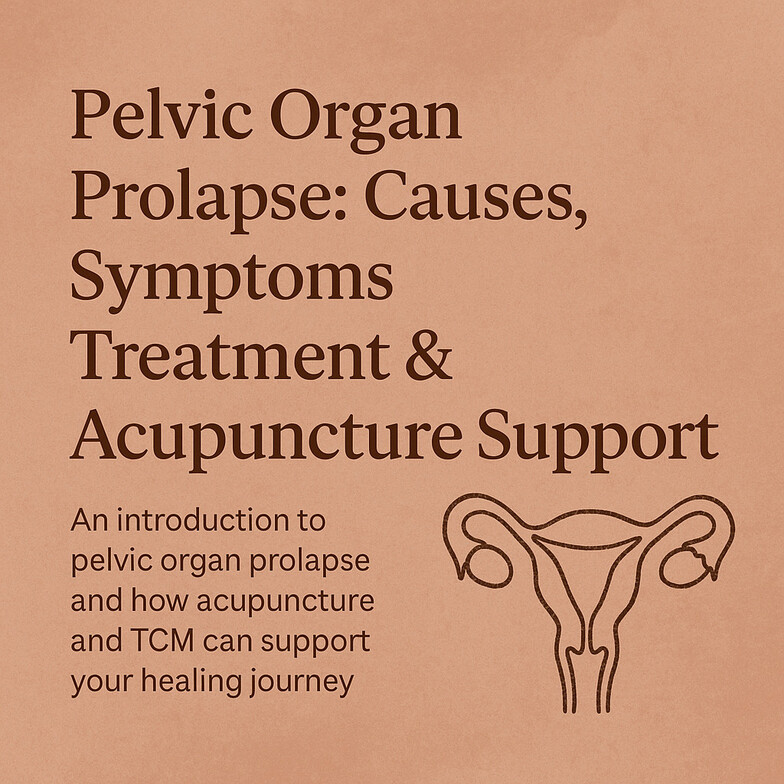
Pelvic Organ Prolapse: What You Need to Know (And How Acupuncture Can Help)
By Dr. Tanya Kelloway, Doctor of Acupuncture and Traditional Chinese Medicine
Pelvic organ prolapse (POP) is more common than many people realize—yet it’s rarely talked about openly. As someone currently deepening my specialization in pelvic floor health, I want to help lift the veil on this condition and share what I’m learning with you.
First, let me say this clearly:
If you’re experiencing symptoms, you’re not alone—and there are effective, compassionate ways to find relief.
What Is Pelvic Organ Prolapse?
Pelvic organ prolapse occurs when the muscles and connective tissues of the pelvic floor weaken, allowing one or more of the pelvic organs—like the bladder, uterus, or rectum—to drop or press into the vaginal space.
This can create symptoms like:
-
A feeling of heaviness or pressure in the pelvis
-
A visible or felt bulge in the vaginal canal
-
Urinary urgency or incontinence
-
Difficulty with bowel movements
-
Discomfort or pain during intimacy
How Is It Diagnosed?
As a Doctor of Acupuncture and Traditional Chinese Medicine, I do not diagnose pelvic organ prolapse. Diagnosis must come from a licensed medical doctor, pelvic floor physiotherapist, gynecologist, or urogynecologist.
If you're being assessed for POP, here’s what to expect:
-
A pelvic exam—often while lying down and also standing or bearing down (pushing slightly), so your provider can observe the position of your organs.
-
In some cases, imaging such as ultrasound or MRI may be used for further evaluation.
It can feel vulnerable to undergo these exams, but please know: this is a common condition, and your practitioner is trained to approach it with respect and care.
What Are the Treatment Options?
The good news? There are many ways to manage and treat POP depending on severity, symptoms, and your goals.
Common Treatment Options:
-
Pelvic floor physiotherapy: Learning how to strengthen (and sometimes relax) your pelvic floor muscles.
-
Pessary fitting: A small silicone device inserted into the vagina to support the organs.
-
Lifestyle modifications: Managing constipation, lifting techniques, and weight support.
-
Hormone therapy: For postmenopausal patients, localized estrogen may support tissue tone.
-
Surgery: In more advanced or symptomatic cases, surgery may be considered to restore pelvic anatomy.
-
Acupuncture & Traditional Chinese Medicine (TCM): To restore balance, address systemic root causes, and support healing holistically.
These options can be life-changing—and they’re not mutually exclusive. Many people combine physical therapy with support from complementary therapies like acupuncture.
Understanding Pelvic Organ Prolapse Through a TCM Lens
In Traditional Chinese Medicine, we don’t just look at the organs—we look at the patterns behind the symptoms. Pelvic organ prolapse is rarely just about local weakness; it’s about systemic imbalance.
Here are some of the most common patterns I see when supporting patients with pelvic floor issues:
Spleen Qi Deficiency & Qi Sinking
In TCM, the Spleen is responsible for holding things in place—organs, blood, even energy. When Spleen Qi is weak, things begin to “sink.”
Common signs:
-
Pelvic heaviness or pressure, especially at the end of the day
-
Fatigue, loose stools, bloating
-
Weak muscle tone and poor appetite
-
Pale tongue with teeth marks; weak pulse
TCM approach: Strengthen and lift using points like ST36, SP6, Ren6, and DU20.
Kidney Yang Deficiency
The Kidneys in TCM govern our foundational energy—what we call Jing, or Essence. Kidney Yang is warming, anchoring, and stabilizing.
Common signs:
-
Pelvic sagging, cold sensations, low back/knee pain
-
Fatigue, low libido, urinary leakage
-
Feeling ungrounded or energetically “hollow”
-
Pale, swollen tongue; deep, slow pulse
TCM approach: Strengthen the root with DU4, BL23, Ren4, and moxibustion.
Kidney Yin Deficiency
Kidney Yin nourishes and cools. Its deficiency is more common in perimenopausal/postpartum patients or those with long-term stress or burnout.
Common signs:
-
Vaginal dryness, heat sensations, restlessness
-
Insomnia, mental agitation
-
Red, peeled tongue; thin, rapid pulse
TCM approach: Nourish Yin using SP6, KI3, Ren4 and supportive herbal therapy.
Liver Qi Stagnation + Tension-Based Prolapse
Sometimes, prolapse symptoms come not from deficiency, but from tension and pressure—often related to emotional holding or trauma.
Common signs:
-
Pelvic floor tightness or spasm
-
Alternating constipation/diarrhea
-
Mood swings, irritability
-
Wiry pulse; red edges on the tongue
TCM approach: Release tension using LV3, GB34, LI4, and Ren6.
A Final Word of Encouragement
If you’ve been dealing with symptoms of pelvic organ prolapse—or even suspect you might have it—please know this:
You’re not broken.
You’re not alone.
And healing is absolutely possible.
This is not just a mechanical issue—it’s a whole-body experience. And healing works best when we address both the root and the symptom, the physical and the emotional. That’s where acupuncture and Traditional Chinese Medicine shine.
Ready to Take the Next Step?
Whether you’ve been officially diagnosed or are just beginning to explore what’s happening in your body, I’m here to support you.
Curious if acupuncture can help? Let’s have a conversation.
Located in Calgary, AB—I offer a safe, trauma-informed space for healing.
Your body is wise. Let’s listen to what it’s saying—and walk the path toward relief, together.
Warmly,
Dr. Tanya Kelloway
Doctor of Acupuncture & Traditional Chinese Medicine

Tanya Kelloway
Contact Me




